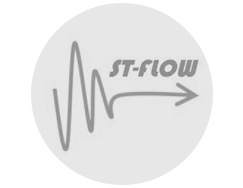The EC FP7 ST-FLOW project merges the efforts of 14 leading European research groups for developing material and computational standards that enable the forward-design of prokaryotic systems with a degree of robustness and predictability that is not possible with customary genetic engineering. The central issue at stake is the identification and implementation of rules that allow the conversion of given biological parts assembled with a set of principles for physical composition into perfectly predictable functional properties of the resulting devices, modules and entire systems. ST-FLOW focuses on each of the steps that go from assembling a DNA sequence encoding all necessary expression signals in a prokaryotic host (by default, E. coli) all the way to the making of the final product or to the behavior of single cells and populations. Two complementary approaches will be adopted to solve the conundrum of physical composition vs. biological functionality of thereby engineered devices. In one case (bottom up), large combinatorial libraries of gene expression signals will be merged with suitable reporter systems and the input/output functions examined and parameterized in a high-throughput fashion. The expected outcome of this effort is to establish experience-based but still reliable rules and criteria for the assembly of new devices and systems -following the same physical composition rules or adopting CAD design. Yet, many outliers (combinations that do not follow the rules) are expected, and making sense of them will be the task of the complementary top-down approach. In this case, ST-FLOW will revisit some of gaps in our knowledge of the gene expression flow (transcription, mRNA fate, translation) that need to be addressed for engineering functional devices from first principles. In addition to the scientific and engineering goals of the project, ST-FLOW will also examine the ethical, legal (IP), safety and societal issues in a context of public dialogue and sound science communication.
Biofaction is leading a work package on the societal and economic dimensions and ramifications of biological standards. In particular we will carry out an analysis of safety and risk assessment issues related to the development and implementation of biological standards. Issues at stake include identification of genuinely novel features of biological standardisation, which have not been tackled in common genetic engineering and biotechnology. We will also stimulate a public dialog and foster interactions with wider audiences, the industry, and the media. Finally we aim to engage in balanced public communication activities preparing suitable (audio-visual) info material for journalists and the public.
Partner in ST-FLOW:
1. Consejo Superior de Investigaciones Científicas, Spain
2. Imperial College of Science, Technology and Medicine, United Kingdom
3. Eidgenössische Technische Hochschule Zürich, Switzerland
4. The University of Birmingham, United Kingdom
5. Universidade Nova de Lisboa, Instituto de Tecnologia Química e Biológica, Portugal
6. Centre National de la Recherche Scientifique, France
7. Isthmus, France
8. Université de Lausanne, Switzerland
9. Bio-Iliberis R&D, Spain
10. Universität Stuttgart, Institut für Bioverfahrenstechnik, Germany
11. University of Valencia, Spain
12. Biofaction, Austria
13. Technische Universität München, Germany
14. The University of Edinburgh, United Kingdom
Contact person: Dr. Markus Schmidt

